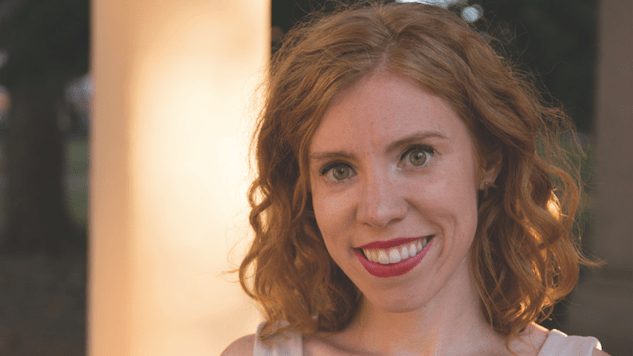I Stayed at a Hotel Run by Turkmenistan’s Secret Police
Photo by David Kelley
Editor’s Note: Audrey Murray is an American writer and comedian whose debut book, Open Mic Night in Moscow, hits shelves today. The book chronicles Murray’s solo travels in the former Soviet Republics, and many of her stories are wild. Check out her essay below to read an anecdote you won’t find in the book.
When I walked into my hotel room in Ashgabat, Turkmenistan, the first thing I saw was a man in a police uniform scrubbing the toilet.
“Oh, sorry!” I yelped, assuming I had stumbled into the wrong room.
But no! He was just a hotel employee finishing up his work, which he quickly did and then left.
I don’t know about you, but I’m not used to seeing police officers moonlighting as hotel cleaning staff. But isn’t that why we travel? To see things that are different, that make us think, that prompt us to wonder things like, “What is the average salary of a police officer in Turkmenistan?”
 I quickly forgot about this incident, because so much in Turkmenistan had been similarly bizarre. The country was run by a dictator whose portrait hung everywhere you could conceivably hang a photograph. The side of banks! The walls of airplanes! The capital city also boasted the highest density of marble buildings in the world, which seemed like the type of record that had been deliberately pursued rather than subsequently awarded. Most of the city had been razed and rebuilt 20 years earlier, so everything looked almost futuristic—if you could pretend architects 100 years from now wanted to build skyscrapers out of marble. In this context, the steady stream of police officers passing through my hotel lobby didn’t stand out to me.
I quickly forgot about this incident, because so much in Turkmenistan had been similarly bizarre. The country was run by a dictator whose portrait hung everywhere you could conceivably hang a photograph. The side of banks! The walls of airplanes! The capital city also boasted the highest density of marble buildings in the world, which seemed like the type of record that had been deliberately pursued rather than subsequently awarded. Most of the city had been razed and rebuilt 20 years earlier, so everything looked almost futuristic—if you could pretend architects 100 years from now wanted to build skyscrapers out of marble. In this context, the steady stream of police officers passing through my hotel lobby didn’t stand out to me.
A few nights later, I was on the phone with an English-speaking tour guide the hotel had called to help translate a problem I was having.
“Well,” the tour guide replied after I finished my story, “I’m not sure what happened, but you will be fine now. Your hotel is run by the police.”
“Wait, what?” I said.
“You didn’t notice, everyone is walking around in police uniforms?”
Now that he mentioned it, I had been a little surprised by the police officer offering turn-down service the night before…and the one taking my breakfast order this morning. But when you travel, you’re so busy keeping an eye out for the new and unexpected, you sometimes put up blinders for anything that registers as remotely familiar. After finding a police officer in my bathroom, I assumed that was normal and then stopped noticing.
-

-

-

-

-

-

-

-

-

-

-

-

-

-

-

-

-

-

-

-

-

-

-

-

-

-

-

-

-

-

-

-

-

-

-

-

-

-

-

-








































